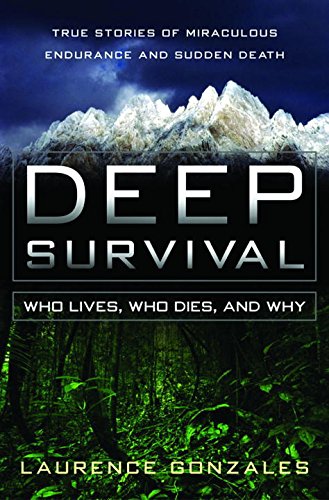Book Review: Deep Survival
Published:
Deep Survival by Laurence Gonzalez explores “Who Lives, Who Dies, and Why” with science and storytelling. While most of the book is in the context of the wilderness, its lessons are directly applicable to the stresses of everyday life, whether at home, in the gym, or at the office.

Here’s paperback, a PDF, and the audiobook.
Utility: ⭐⭐⭐ (3/5)
Writing: ⭐⭐⭐⭐⭐ (5/5)
Gonzalez is a great narrator. Each one of the stories is told with great suspense, keeping me mentally on the edge of my seat, even as I physically doze off on the couch. The entire book traces a broader narrative about the author’s father and his surreal struggle to survive an air plane crash during World War II. Sometimes, the stories crowd out the actual content, which is annoying for a textbook-lover like myself. But if you’re not a fan of “facts, then narration” (most of my other reads), then this is definitely a book for you.
Notes
I listened to the audiobook, so I didn’t take line-by-line notes. Instead, here are some words of advice from the last chapter of the book which I found insightful.
Staying out of Trouble
Better to prevent a disaster than to get out of one. Here are six simple R’s to keep yourself safe:
- React to your environment. Develop alertness to notice incoming danger and the humility to change course.
- Reflect before you act. Even the best can become ensnared by impulse, leading to irreversible mistakes.
- Read. Practice. Ask. Master your task and know which risks you shouldn’t take.
- Recognize your limits. Cockiness clouds the mind and impairs decision-making. Adopting a beginner’s state of mind instills caution and growth.
- Reevaluate the situation. When a mission is doomed, there’s no shame in quitting, and there’s certainly much less regret.
- Rationalize. Keep control over your emotions, and maintain a positive attitude. Self-pity won’t get you anywhere.
Getting Out of Trouble
Once you’re in a survival situation, model these 12 behaviors from real survivors:
- Perceive, believe. Survivors remain perceptive amid immense stress. They quickly evaluate and accept the situation, adopting a “what now?” mindset.
- Stay calm. Survivors channel their fear into productive energy, maintaining a constant, inner peace.
- Think, analyze, plan. Survivors rule their own minds. They develop routines and plans.
- Take bold, decisive action. Survivors act on their plans, using subtasks and taking risks when necessary.
- Celebrate. Survivors pause to appreciate their successes and progress.
- Rescue. Survivors always have a bigger goal in mind, whether it be rescuing a companion or making it back to their family.
- Play. Survivors play! Whether singing, mathematics, or poetry, play stimulates and sharpens the brain—the key to survival.
- Notice beauty. Survivors are attuned to world around them.
- Believe in yourself. Survivors are more than confident; they have a strong conviction that they will survive.
- Surrender. Survivors accept their circumstances and their fate.
- Do what is necessary. Survivors take on seemingly impossible tasks, aware of their own limits.
- Never give up. Survivors accept setbacks and adversity, but move onward relentless.
